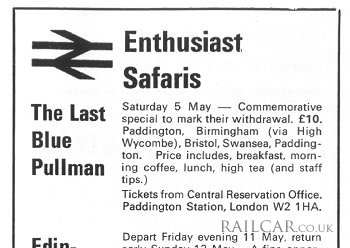Blue Pullman
Rundown and Withdrawal
The British Railways Board announced on the 20th November 1972 that the sets would be withdrawn from the start of the summer 1973 timetable when they would be replaced by loco-hauled MkII stock.
The 6-car sets were known to still be working in multiple until July 1971, but after that it seems at least one was split up and mixed with eight car vehicles. This regularly worked the Bristol Pullman comprised of half a WR rake and four LMR vehicles and comprised all six vehicle types. Formed of LMR DMBF (downgraded) 60093, LMR M/TFK (also downgraded?) 60731, three TFs (2 LMR, 1 WR) 60742 / 60743 / 60747, WR TFK 60737,WR M/TS 60647, WR DMBS 60096, the London facing end was the LMR vehicles.
There was also two 8-car sets running in correct formation except a DMBF from a 6-car set (which also ran the farewell tour) operating that final workings of the South Wales Pullman, one with the LMR car at the London end, the other on the non-London end.
The services continued until the 4th May '73.
Farewell Tour
The WR organised the "Blue Pullman Commemorative" tour which ran on the 5th May 1973. The vehicles used were the London-based South Wales Pullman set 60090 / 60645 / 60735 / 60745 / 60744 / 60734 / 60644 / 60094 (60094 at the London end).
It departed from Paddington platform one at 08:53. It travelled via High Wycombe, Banbury to Leamington Spa, then took the by then single track of the former LNWR line to Coventry via Kenilworth and then onto Birmingham New St. Next it went via Cheltenham to Bristol Temple Meads, and after a few minutes there it proceeded via the Severn Tunnel to Swansea arriving at 14:19.

The return departed at 17:10 and with the only booked stop being a three minute crew change at Cardiff between 18:08/18:11. It was due back in Paddington at 20:20, running via Bristol Parkway, Didcot and Slough. An unscheduled stop had to be made at Neath to eject an elderly gentleman who claimed to have 'got on the wrong train' at Swansea. This did no harm to timings though, as Cardiff was reached eight minutes early, setting the pace for the rest of the trip. The departure from Cardiff, seven minutes early saw the train slowed by signalling, and by Newport the train was six minutes late. From then on though, there were some outstanding timings, with the 133 miles from Newport to Paddington covered in 99 mins, an average speed of 80.6 mph. The fastest section, the 41 miles from Swindon to Reading was done at an average of 87.8 mph. The capital was reached at 20:02, 18 mins early.
Summary
Development
Press run 24/6/60
Press run 7/9/60
Staff difficulties
Ownership agreement
Manufacturer's Publicity
Description
Type 1 - LMR motor car
Type 2 - WR motor car
Type 3 - WR parlour 2nd car
Type 4 - LMR kitchen car
Type 5 - WR kitchen car
Type 6 - LMR/WR parlour 1st car
Interior
Air conditioning
Motor cars
Auxiliary power
Bogies & couplings
Brakes
Data
Sub contractors
Staff instructions
LMR services begin
LMR Publicity
LMR brochure
LMR handbills
Controversy
WR services begin
WR publicity
WR publicity brochure
WR publicity leaflet
LMR Operations
WR Operations
Liveries
Rundown & withdrawal
After service & preservation
Disposal
Maintenance Manuals
Miscellaneous
Acknowledgments & Further Reading
Images
No vehicles were preserved.


